June 2024
Sharing REAL with Parents and Supporting Babies’ Next Steps (2016 - 2023)
June 2024
Sharing REAL with Parents and Supporting Babies’ Next Steps (2016 – 2023)
1.0 Executive Summary
This Learning Journey tells the story of Lambeth Early Action Partnership’s Sharing REAL service for parents with children aged 18 months to 4 years – and how it led to a further service for parents with babies from 0-11 months, called Supporting Babies’ Next Steps (SBNS).
Learn how we delivered an evidence-based early years communication and language service to families living in areas of greatest deprivation. Discover how working with other early years services, and implementing a Train the Trainer model, sustains these critical services.
Authors
Catherine Keal, Communication, Language and Literacy Programme Manager, LEAP.
Jo Gordon, Lambeth Early Years Schools and Educational Improvement Consultant/LEAP CLD lead.
Jacqui McDermid, Lambeth Early Years Schools and Educational Improvement Consultant/LEAP CLD lead.
Herbie Hyndley, Project Coordinator, LEAP.
Carla Stanke, Public Health Specialist, LEAP.
Who is this for?
These learnings provide a blueprint for those responsible for improving early literacy skills in their communities. This report will be useful for anyone with a professional or academic interest in communication and language development in early childhood.
The background
Good communication and language skills are an essential part of early childhood development. Children with strong communication skills are better able to interact with others, make friends and have healthy interpersonal relationships.
Children are at risk of school failure, low self-esteem and poor social skills without solid foundations in language and communication skills. 7.5% of children entering school have clinically significant language and communication difficulties. This equates to 2 children in every classroom. These children also show elevated symptoms of social, emotional and behavioural problems.
Without effective help, a third of children with speech, language and communication difficulties will need treatment for mental health issues later in life. As many as 71% of sentenced children in the youth justice system had speech, language and communication needs.
The quality of the home learning environment has a major impact on a child’s development. A child’s socio-economic circumstances are recognised as a significant barrier to strong communication, language and literacy development. Three quarters of children, who experience persistent poverty throughout their early years, start school without the language skills they need for learning.
Children living in the LEAP area of Lambeth are significantly less likely to achieve expected communication and language development than in the rest of Lambeth.
Sharing REAL with Parents and Supporting Babies’ Next Steps aim to improve the home-learning environment and develop early literacy skills through building parent/carer knowledge and confidence about what they do with their young children. They give parents the opportunity to talk and learn from each other, as well as from the providers.
Headline numbers
Key stats about Sharing REAL with Parents:
- 148 parents and carers reached
- 177 children benefitted
- 69% of parents said service had a very positive impact on their knowledge
- 72% said service had a very positive on their confidence
- 57% of adults and children lived in the LEAP area – of these, 93% lived in more deprived areas
Key stats about Supporting Babies’ Next Steps:
- 104 families (112 adults + 116 children) reached
- 63% of parents and carers lived in the LEAP geographic area – of these, 90% lived in more deprived areas
- 69% of parents said service had a very positive impact on their knowledge
- 78% said service had a very positive on their confidence
- 84% said they were very likely to read to their babies every day
- 87% said they would talk or sing with their baby every day
- 73% said they were very likely to use daily routines to support early literacy development
2.0 Purpose of this document
LEAP developed this Learning Journey to capture the story of LEAP’s Sharing REAL with Parents service over its lifetime: from its inception to the end of its journey as part of the LEAP programme.
A key focus of a Learning Journey is on implementation: how the service was delivered and the different resources required to do this. Learning Journeys are service summaries, not service evaluations, and are part of a wider suite of LEAP research and learning projects designed to capture insights into our progress towards giving children in the LEAP area a better start in life.
Information contained within this report was taken from national policy and evidence as well as from a variety of internal LEAP documents including:
- service plans
- theories of change
- monitoring, evaluation and learning frameworks
- quarterly narrative reports and service data reports
- workforce and client feedback
- minutes from service reviews and team meetings
Learning Journeys were co-written between service leads and members of the LEAP team, and the Key Messages were based on high level reflections drawn not only from the available data but also from insights gleaned over years of service delivery.
We will share our Learning Journeys with key stakeholders including the National Lottery Community Fund, local early years commissioners and public health colleagues, service delivery partners, families and via national public health networks as appropriate.
Our hope is that the learning from the LEAP programme can inform future commissioning and programming decisions and contribute to the wider evidence base about health improvement interventions in the earliest years.
3.0 Background
3.1 What is LEAP?
Lambeth Early Action Partnership (LEAP) is one of five local partnerships which make up ‘A Better Start’, a national 10-year (2015-2025) test-and-learn programme funded by the National Lottery Community Fund that aims to improve the life chances of babies, very young children, and families. LEAP is a ‘collective impact initiative’, which means that our services and activities link together and work towards shared goals to improve outcomes for very young children.
3.2 Why is communication, language and literacy development in the early years important?
The importance of early language development and communication in children is well-established. Good communication and language skills are an essential part of early childhood development. Children with strong communication skills are better able to interact with others, make friends and have healthy interpersonal relationships.
Children are at risk of school failure, low self-esteem and poor social skills without solid foundations in language and communication skills, and there is evidence that children with ongoing language difficulty achieve lower academically.1 7.5% of children entering school have clinically significant language and communication difficulties. This equates to 2 children in every classroom.
In addition, these children also show elevated symptoms of social, emotional and behavioural problems.2 There is also evidence that without effective help, a third of children with speech, language and communication difficulties will need treatment for mental health issues later in life.3
Children with poor vocabulary at age five are twice as likely to experience periods of unemployment as adults.4 They are also more at risk of interacting with the criminal justice system. As many as 71% of sentenced children in the youth justice system between April 2019 and March 2020 had speech, language and communication needs.5
The Tickell Review emphasised that children’s learning is a result of interacting with people and their environment from birth.6
3.3 Barriers and enablers to communication and language development (CLD)
The importance of the home-learning environment (HLE) and its impact on child development has been well established.7 The quality of the home-learning environment has a major impact on a child’s development; what parents do is more important than who parents are.8
A child’s socio-economic circumstances are recognised as a significant barrier to strong communication, language and literacy development. There is poor take up of free early education for two-year-olds and poorer quality early years provision in parts of the sector in disadvantaged areas of the UK.9
Three quarters of children who experience persistent poverty throughout their early years start school without the language skills they need for learning.10 There is a clear social gradient for language, with children from the most disadvantaged groups having lower language skills than those in the least disadvantaged groups. Those from the most disadvantaged groups are the least likely to catch up.11 This is particularly relevant for LEAP’s context: those children who live in the most deprived areas are part of LEAP’s target population.
With this established link between socio-economic circumstances and language development, it is also very relevant to consider the links between child poverty and ethnicity. Research from the Office of National Statistics explored the correlation between child poverty and educational outcomes, focused on ethnicity. This report found that the likelihood for children in Black households to experience poverty is notable: 30% live in low-income households and 22% live in low income and material deprivation.12
Similarly, Black, Asian and ethnic minority households in the UK are more than twice as likely to live in poverty as their white counterparts, and socioeconomic context has a huge impact on children’s development.13
3.4 Understanding the level of need
Early Years Foundation Stage Profile (EYFSP) data analysis from the years 2012-2013 to 2017-2018 demonstrates that children from Lambeth are significantly less likely to achieve at least expected communication and language development (CLD) at the end of Reception if they live in the LEAP wards than non-LEAP Lambeth wards.
This same report also demonstrates that children eligible for pupil premium (e.g., those children eligible for free school meals) are significantly less likely to achieve at least expected CLD in Reception than children not eligible for pupil premium, and children of non-White British background are significantly less likely to achieve expected CLD than their White British peers.14
Figure 1 shows the percentage of children in reception in the LEAP area who achieved a ‘good level of development’ in CLD in 2014-2019 and 2022-2023.15 It clearly demonstrates the difference between ethnic groups and is one example of how data is used to support LEAP’s aim to prioritise families from Black, Asian and other minority ethnic groups.
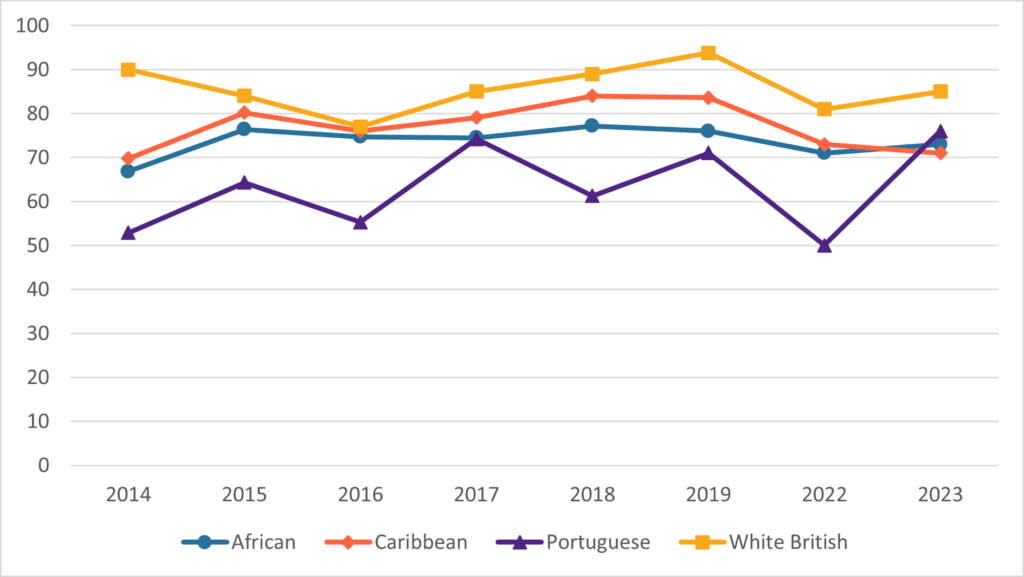
4.0 LEAP’s Sharing REAL with Parents service: for parents with children aged 18 months to 4 years
To address the barriers to good communication and language development in young children, and to narrow the gap in outcomes, Sharing REAL with Parents (SRP) was selected as one of the services that comprised LEAP’s CLD strand of work. Sharing REAL (Raising Early Achievement in Literacy) with Parents is a programme based on the research of Professor Peter Hannon and Professor Cathy Nutbrown at Sheffield University.16
SRP aims to improve the home-learning environment through building parent/carer knowledge and confidence about what they do with their young children to build early literacy skills. It focuses on four strands of literacy: oral language, environmental print, books and early writing. The ORIM Framework, which stands for Opportunities, Recognition, Interaction and Modelling, provides the framework for embedding the four strands of literacy. SRP training is available nationally through the National Children’s Bureau (NCB).17
SRP was facilitated by NCB trainers and the LEAP CLD team, which consists of Lambeth Early Years Schools and Educational Improvement Consultants (who also act as LEAP CLD leads) and LEAP’s Communication, Language and Literacy Programme Manager.
Families found out about the service by attending community engagement events and via children’s centre activities.
To deliver SRP, the LEAP CLD and NCB teams:
- Delivered two-hour weekly sessions for four weeks with families. Parents were supported to implement the four strands of literacy using the ORIM framework
- Distributed a resource pack to each family. The pack contained key literacy messages and activities to do with children at home
When SRP was first delivered through LEAP, parents were able to choose to work towards a National Open College Network (NOCN) qualification. Eventually this stopped because of low uptake.
LEAP developed a Theory of Change (ToC) for SRP (Figure 2). The key desired outcome of parents was to provide an improved home-learning environment for their child and sustain these changes over the longer term by achieving the following medium-term outcomes:
- Parents have increased knowledge, confidence, and motivation to provide an improved home learning environment for their child
- Better Start workers feel confident and competent to deliver Sharing REAL
- Parents from our target population feel more confident about supporting their child’s early learning
- Participants from other services hear and respond positively to key Sharing REAL messages
- Sharing REAL families access free childcare places and LEAP community activities, SaLT and Chattertime
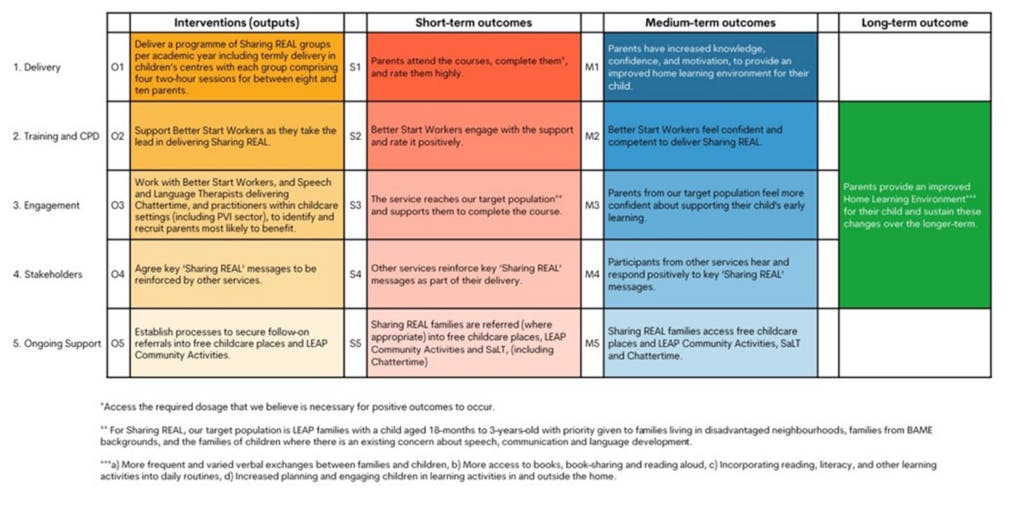
4.1 Expanding the offer for children under 1: development and implementation of Supporting Babies’ Next Steps
We observed that parents increasingly requested to attend SRP with younger children. Parents from LEAP’s Baby Steps service (which aims to prepare parents for the birth of their baby and their transition to parenthood) requested further courses that they could attend with their babies. Because of this, the CLD leads developed a service called Supporting Babies’ Next Steps (SBNS) for parents with babies from 0-11 months. SBNS was based on the principles of Sharing REAL. It used the ORIM framework and the four strands of literacy relevant for this age group: communication and language; books and storytelling; songs, rhymes and music; and early mark making.
SBNS was delivered by the LEAP’s Lambeth Early Years Schools and Educational Improvement Consultants.
Families were signposted to SBNS from the LEAP Baby Steps service and at community engagement events, as well as hearing about it during children’s centre activities.
To deliver SBNS, practitioners:
- Delivered two-hour weekly sessions for four weeks with families. Parents were supported to implement the four strands of literacy using the ORIM framework, adapted for babies from 0 – 11 months old
- Distributed a resource pack to each family. The pack contained key communication and language development messages and activities to do with babies at home
LEAP developed a Theory of Change (ToC) for SBNS (Figure 3). The key desired outcome was for parents to provide a good early home learning environment for their child by achieving the following medium-term outcomes:
- Parents have increased knowledge and confidence, and increased motivation, to support their child’s learning in the home
- Our target population has increased knowledge and confidence, and increased motivation, to support their child’s early learning in the home
- Participants from other services hear and respond positively to the service’s key messages
- Families referred onwards to Chattertime access the service
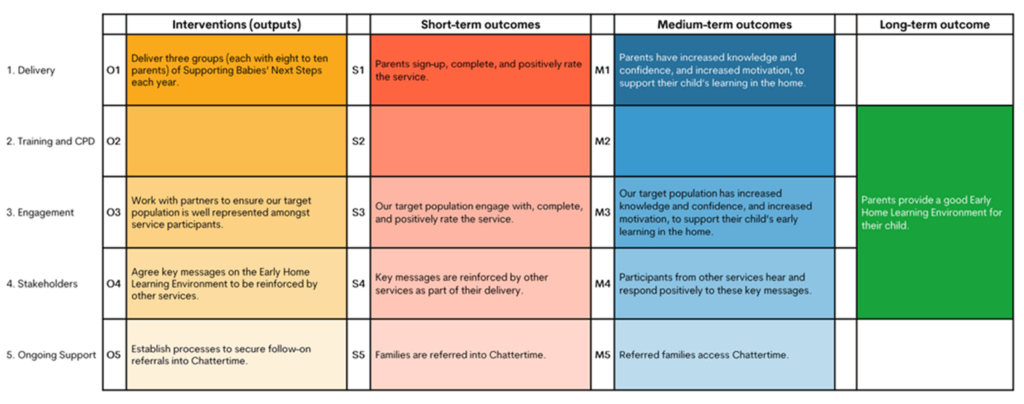
4.2 Outcomes, reach and feedback
4.2.1 Sharing REAL with Parents
SRP was run by LEAP from November 2017 until December 2023. 26 rounds were delivered, running either once or twice per term. SRP reached a total of 148 parents and carers, along with 177 children. The sessions were mostly held in local Lambeth Children’s Centres, although some sessions were held in local childcare settings.
Data about changes in parental knowledge, confidence and motivation, along with demographic data, was collected over the lifetime of the service. Based on this data, it is possible to reflect on two of the medium-term outcomes identified in the service’s ToC.
Medium-term outcome 1: Parents have increased knowledge, confidence, and motivation to provide an improved home learning environment for their child.
Parents were asked to rate the effect that the sessions had on their knowledge and confidence around early literacy, and results are positive. 69% (n = 39) of parents reported that the service had a very positive impact on their knowledge, and 72% reported that the service had a very positive impact on their confidence (Figure 4). No one reported that the service had a negative/very negative effect.
Outcome completion numbers are relatively low compared to lifetime attendances as the measures were implemented in the autumn of 2021, when LEAP introduced its Shared Measurement System (SMS). The SMS integrates data from LEAP services. It enables us to monitor performance, and track progress towards outcomes, and includes a common set of outcome measurement tools.
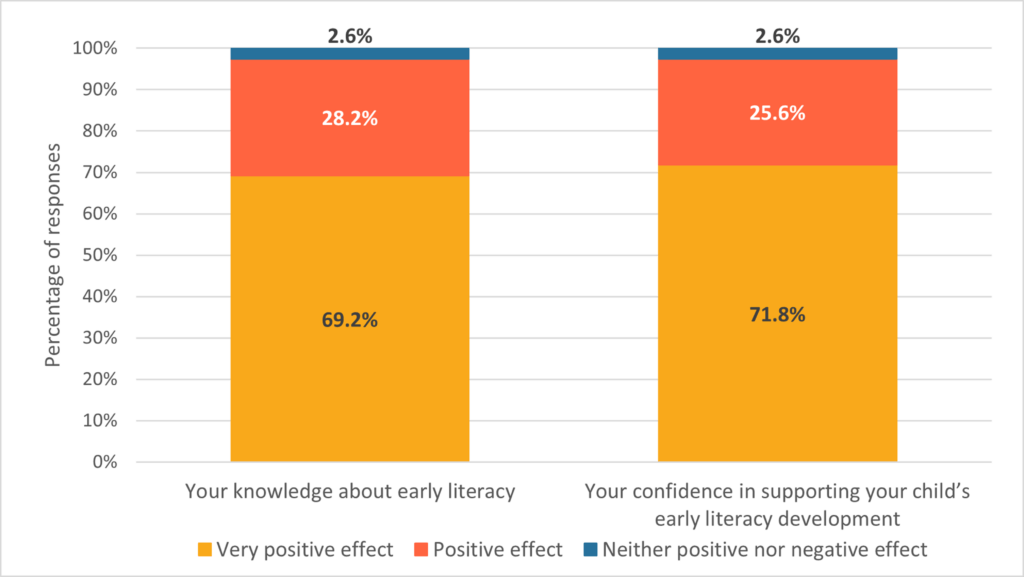
Sharing REAL with Parents gives parents the opportunity to talk to other parents and learn from each other, as well as from the providers. Feedback showed that this was valued by parents and supported them to increase their confidence and motivation. Examples of parent feedback include:
Great to learn new things I can do with my children to help improve their reading and writing. Good to learn from other parents.
The sessions were really organised and dynamic. The families also had a lot of time to discuss different issues.
Helped me understand the importance of early mark making and enjoying the world around us.
It highlighted areas that I am currently doing which count towards my child’s development. This is reassuring and what I’ve learnt through these sessions are being put into practice.
The course was very informative and gave me new skills and ideas about literacy. I felt like my needs were listened to and that the group was very supportive.
When I first started I did not know much about the learning activities or resources all around near me, but definitely you can learn a lot from outside world so teacher is great.
Medium-term outcome 3: Parents from our target population feel more confident about supporting their child’s early learning.
SRP achieved its aim of reaching parents from LEAP’s priority population. 57% of SRP participants (adults and children) lived in the LEAP geographical area; of these, 93% lived in more deprived areas (IMD quintiles 1 and 2). 68% of all participants identified their ethnicity as Black, Asian, mixed or other, and 51% spoke English as an Additional Language.
Other medium-term outcomes
Data was not collected on medium-term outcome 2 (Better Start workers feel confident and competent to deliver Sharing REAL) as Better Start workers were not trained because of capacity constraints.
Data was not collected on medium-term outcome 4 (Participants from other services hear and respond positively to key early literacy messages). Throughout the lifetime of the service, links were made with the community engagement team at LEAP, and a very effective relationship was established with LEAP’s Community Connector, whose role it was to engage new families with the broad LEAP offer and have a visible presence in the community.
The programme also utilised strong links with the Family Engagement Worker in Stockwell to support with recruitment and to build relationships with one local school and its stay and play sessions. From 2021 onwards, SRP had nine participants who had previously attended Supporting Babies’ Next Steps, which meant those parents had key messages reinforced at different stages of their child’s early years.
Data was not collected on medium-term outcome 5 (Sharing REAL families access free childcare places and LEAP community activities, SaLT and Chattertime). Throughout the lifetime of SRP, other services such as Chattertime sessions and LEAP Community activities were signposted to participants.
Where appropriate, families were also given information about free childcare places in Lambeth and discussions were had about Speech and Language Therapy (SaLT) services, sometimes with representatives from the SALT team coming to the final sessions. Since data was not collected on the number of families who went on to access these services it is not possible to measure progress against this medium-term outcome.
4.2.2 Supporting Babies’ Next Steps
Supporting Babies’ Next Steps was run by LEAP from January 2020 until May 2024. 13 rounds were delivered, reaching 104 families (112 adults + 116 children). The sessions were held in local Lambeth Children’s Centres.
Data about changes in parental knowledge, confidence and motivation, along with demographic data, was collected over the lifetime of the service. Based on this data, it is possible to reflect on two of the medium-term outcomes identified in the service’s ToC.
Medium-term outcome 1: Parents have increased knowledge, confidence, and motivation to provide an improved home learning environment for their child.
Parents were asked to rate the effect that the sessions had on their knowledge and confidence around supporting early literacy. 69% of parents reported that the service had a very positive impact on their knowledge, and 78% reported that the service had a very positive on their confidence (Figure 5).
Parents were also asked about their likelihood to engage in targeted behaviours to support early literacy and the findings were equally positive: 84% said they were very likely to read to their babies every day, 87% said they would talk or sing with their baby every day and 73% said they were very likely to use daily routines to support early literacy development (Figure 6).
While scores for the likelihood of creating opportunities for early mark making were lower (53% of parents reported they were very likely to do this), this could be attributed to the age of the babies who may have been too young to participate in mark making activities.
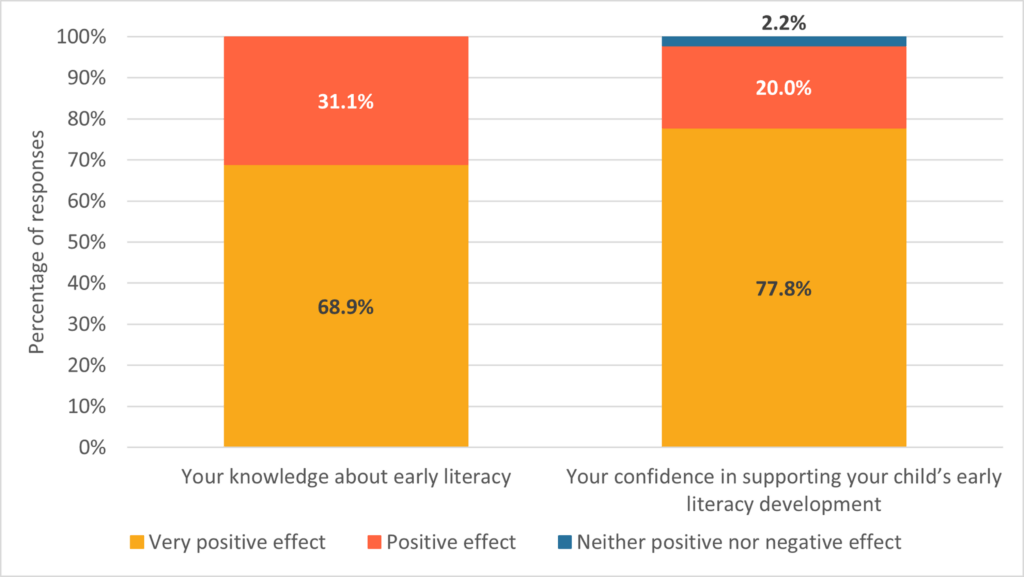
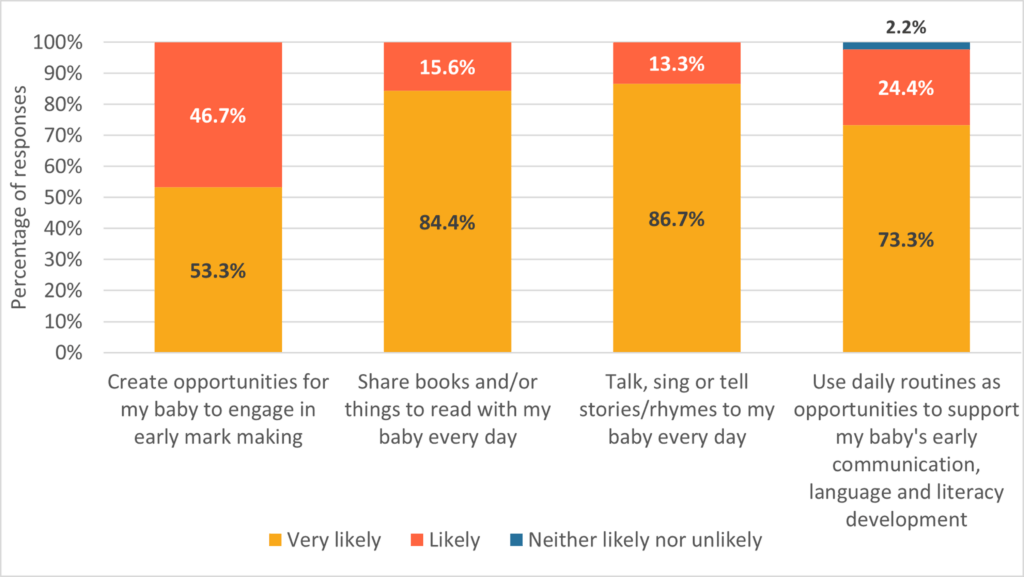
Parents appreciated the helpful tips and learning opportunities that SBNS provided across the four sessions. Some parents offered these reflections:
I thought it was a good mix of interesting theoretical learning, practical tips, and some fun at the sessions. … It was nice to be doing songs and activities but with a purpose and a structure and to feel like you’re learning at the same time.
I thought the sessions were brilliantly facilitated and so useful to me as a new mother. I’ve picked up some great tips and skills on how to help my baby develop, how to engage him and help him learn age appropriately.
… (the sessions were) excellently taught, generous with time and understanding of our needs.
Parents also told us that they appreciated weekly reminders of date and time of the upcoming session. On occasions where parents could not attend a session due to illness of themselves or their baby, they were able to meet with the facilitator on another day to have a catch-up session.
Medium-term outcome 3: Parents from our target population feel more confident about supporting their child’s early learning.
SBNS achieved its aim of reaching parents from LEAP’s priority population. 63% of parents and carers who participated in SBNS lived in the LEAP geographic area; of these, 90% lived in more deprived areas (IMD quintiles 1 and 2). 34% of all participants identified their ethnicity as Black, Asian, mixed or other, and 42% spoke English as an Additional Language.
Other medium-term outcomes
Data was not collected on medium-term outcome 4 (Participants from other services hear and respond positively to key early literacy messages). There was a very strong partnership developed with Baby Steps, a LEAP service aimed at giving parents-to-be confidence in becoming parents, whilst also meeting other parents in a relaxed group setting.
Most of the recruitment to SBNS came through Baby Steps, either through visits by the facilitators of SBNS or through signposting by the Baby Steps practitioners. There were also effective links with the Breastfeeding Peer Support team and LEAP’s Community Connector, who regularly signposted parents to SBNS.
Data was not collected on medium-term outcome 5 (Families referred onwards to Chattertime access the service). Throughout the lifetime of SBNS, other services such as Chattertime and LEAP community activities were signposted to participants.
Where appropriate, families were also given information about free childcare places in Lambeth and discussions were had about Speech and Language Therapy (SaLT) services, sometimes with representatives from the SALT team coming to the final sessions. Since data was not collected on the number of families who went on to access these services it is not possible to measure progress against this medium-term outcome.
4.3 Long-term outcome
The LEAP Sharing REAL with Parents and Supporting Babies’ Next Steps services sought to support parents to provide an improved home learning environment for their child, as outlined in the theories of change (Figure 2 and Figure 3).
The services and the associated long-term outcome were evidence informed. The literature7 suggests that the home learning environment has a strong influence on child development. Since children from the most disadvantaged groups have lower language skills than those from the least disadvantaged groups,11 targeted CLD services can have a positive impact on early communication and language development.
Population data cannot be used to explore changes in the home learning environment, so it is not possible to assess the extent to which the service contributed to the longer-term outcome. However, we are confident that the service made a positive contribution to improving the home learning environment of the families it engaged. This confidence stems from data about the services’ reach, along with data on changes in parent/carer knowledge, knowledge about early literacy development and qualitative feedback from parents.
4.4 Successes
Knowledge and confidence improved for participants in both SRP and SBNS, and feedback for both is overwhelmingly positive. This demonstrates the usefulness of these services.
Both services were successful in reaching LEAP’s priority population.
SBNS is very popular and there is often a waiting list as interest is so high.
4.5 Challenges
Challenges with delivery
Sharing REAL with Parents (SRP)
Until 2020, parents who took part in SRP had the choice to work towards a National Open College Network (NOCN) qualification. Whilst this was a positive outcome for the parents who chose this option, the process was challenging. Paperwork, each week, was comprehensive.
Time needed to be allocated at the end of the process for individual parent interviews, to discuss and assess their learning. Additionally, for the parents that didn’t choose this option, the fourth session was less relevant. Later in the programme, the decision was made by NCB to withdraw the NOCN option from Sharing REAL with Parents.
Supporting Babies’ Next Steps (SBNS)
In 2022 we decided to trial online booking through LEAP’s What’s On webpage. This led to more non-LEAP families signing up first and taking most of the places. As a result, LEAP families were placed on a waiting list. After two rounds of recruiting using this method, we decided to revert to sign-ups via email to the facilitator, who could then prioritise LEAP families.
Challenges with engagement
Sharing REAL with Parents (SRP)
Recruitment of families to participate in the programme has been inconsistent. In the initial stages of the programme, the children’s centre staff had responsibility for the recruitment of families, and this was successful.
As time went on, children’s centre staff weren’t as consistent with their recruitment strategies. LEAP staff became more involved in the recruitment of parents. Personal visits from LEAP staff to nurseries within primary schools, and community engagement activities, where they spoke with individual parents, was more effective.
Maintaining attendance across the four sessions has also been a consistent challenge. Data showed that 69% attended 3 or more sessions, with an overall average of 3 sessions attended. Actions taken to mitigate this issue included:
- personal phone calls before the commencement of the programme to form a personal connection with each parent; and
- weekly reminder text messages, the day before the morning of each session.
After initial success with participant numbers, we decided to increase the offering from once a term to twice a term. However, this did not result in an increase in participants.
Total numbers were the same as when it was run termly, therefore it was decided to revert to offering it only once termly. Anecdotal insights from the CLD team suggests that the main reason numbers were lower was because parents of this age group of children were more likely to have returned to work.
Supporting Babies’ Next Steps (SBNS)
Parents engaged well with SBNS, there were no identified challenges around engagement.
5.0 Sustainability and next steps
Sharing REAL with Parents (SRP)
In 2022-2023, a trainer from Morley College completed the ‘Train the Trainer’ process alongside LEAP’s Communication, Language and Literacy Programme Manager. She can now facilitate Sharing REAL with Parents beyond the life of LEAP, in liaison with Lambeth Children’s Centres, and has already delivered one course.
Supporting Babies’ Next Steps (SBNS)
Supporting Babies’ Next Steps will continue to be developed through the Early Childhood Unit at the National Children’s Bureau. It was trialled in the Lewisham Local Authority in February 2024.
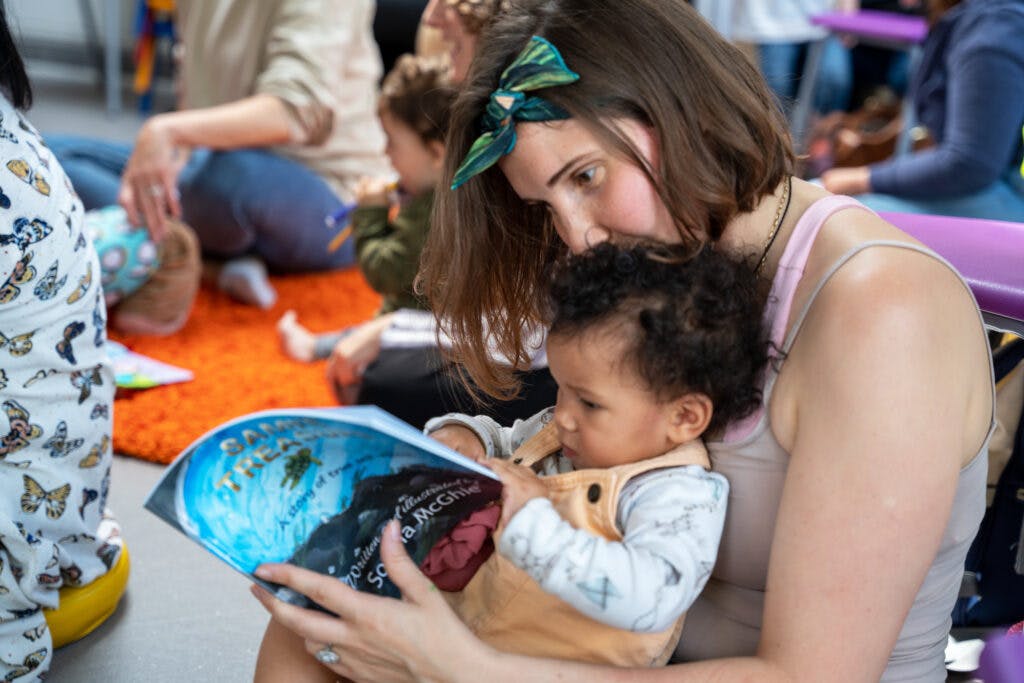
6.0 Key messages
- LEAP delivered an evidence-based early years communication and language service that was well-aligned with national policy and priorities.
- Sharing REAL and Supporting Babies’ Next steps successfully reached our priority population as most participants lived in areas of greatest deprivation.
- Feedback from families about SBNS is overwhelmingly positive and there is often a waiting list to participate, which indicates an appetite for earlier CLD support and advice for babies
- Integrated working and clear signposting pathways with other early years services are important for recruitment, especially in areas with high levels of need
- Implementation of a Train the Trainer model in children’s centres and large nurseries would enable the services to be more sustainable in the longer term.
7.0 Appendix
Colleagues at LEAP and National Children’s Bureau who have been involved in the implementation of Making It REAL at LEAP:
Lambeth Early Action Partnership:
Laura McFarlane: Director
Jo Gordon: Lambeth Early Years Schools and Educational Improvement Consultant/CLD strand lead
Jacqui McDermid: Lambeth Early Years Schools and Educational Improvement Consultant/CLD strand lead
Angela Russell: Early Literacy Quality Improvement Officer
Catherine Keal: Communication, Language and Literacy Programme Manager
National Children’s Bureau:
Helen Wheeler: Early Childhood Unit
Nick McKenzie: Early Childhood Unit
Sarah Creek: Early Childhood Unit
Paul Cutler: National Children’s Bureau Training Associate